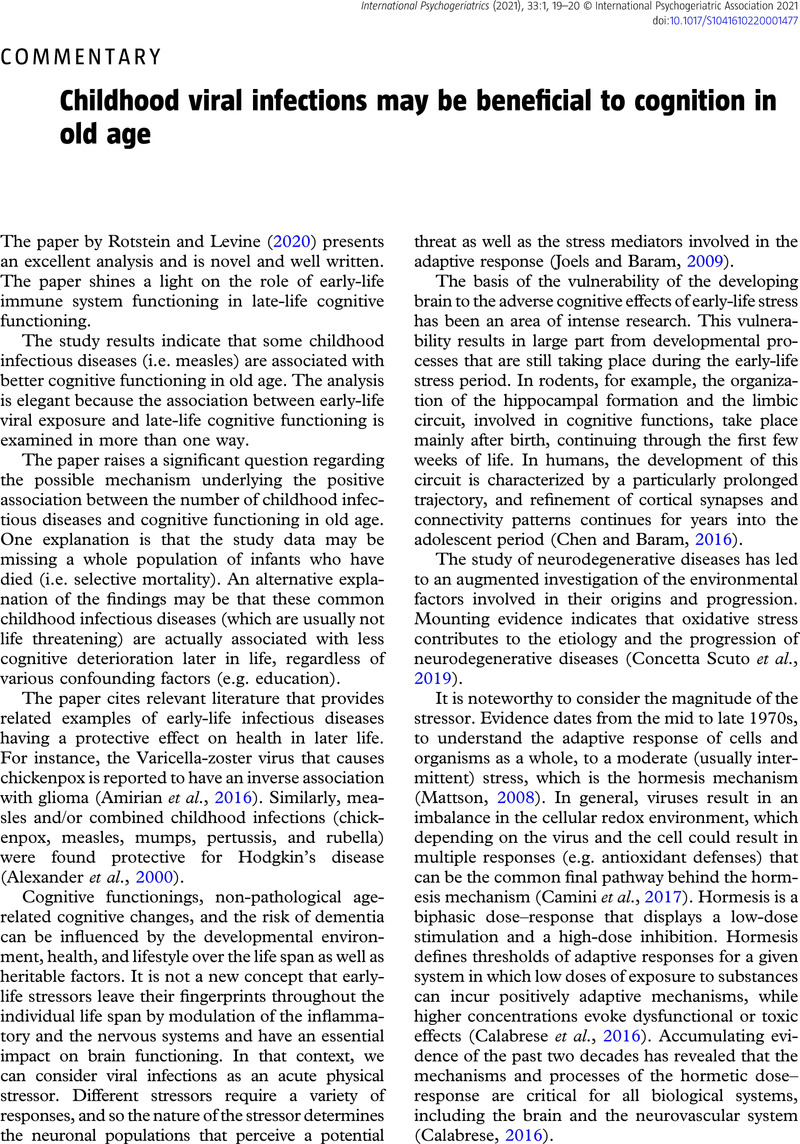No CrossRef data available.
Article contents
Childhood viral infections may be beneficial to cognition in old age
Published online by Cambridge University Press: 05 February 2021
Abstract
An abstract is not available for this content so a preview has been provided. Please use the Get access link above for information on how to access this content.

- Type
- Commentary
- Information
- International Psychogeriatrics , Volume 33 , Special Issue 1: Issue Theme: Assessment of Risk Markers for Cognitive Impairment , January 2021 , pp. 19 - 20
- Copyright
- © International Psychogeriatric Association 2021
References
Alexander, F. E. etal. (2000). Risk factors for Hodgkin’s disease by Epstein-Barr virus (EBV) status: prior infection by EBV and other agents. British Journal of Cancer, 82, 1117–1121.CrossRefGoogle ScholarPubMed
Amirian, E. S. etal. (2016). History of chickenpox in glioma risk: a report from the glioma international case-control study (GICC). Cancer Medicine, 5, 1352–1358.CrossRefGoogle Scholar
Calabrese, E. J. (2016). Preconditioning is hormesis part II: how the conditioning dose mediates protection: dose optimization within temporal and mechanistic frameworks. Pharmacological Research, 110, 265–275.CrossRefGoogle ScholarPubMed
Calabrese, V. etal. (2016). Major pathogenic mechanisms in vascular dementia: roles of cellular stress response and hormesis in neuroprotection. Journal of Neuroscience Research, 94, 1588–1603.CrossRefGoogle ScholarPubMed
Camini, F. C., da Silva Caetano, C. C., Almeida, L. T. and de Brito Magalhaes, C. L. (2017). Implications of oxidative stress on viral pathogenesis. Archives of Virology, 162, 907–917.CrossRefGoogle ScholarPubMed
Chen, Y and Baram, T. Z. (2016). Toward understanding how early-life stress reprograms cognitive and emotional brain networks. Neuropsychopharmacology, 41, 197–206.CrossRefGoogle ScholarPubMed
Concetta Scuto, M. etal. (2019). Curcumin, hormesis and the nervous system. Nutrients, 11. doi: 10.3390/nu11102417
CrossRefGoogle ScholarPubMed
Griffiin, W. S. T. and Mrak, R, E. (2009). The hygiene hypothesis and Darwinian medicine. Berlin: Springer.Google Scholar
Joels, M. and Baram, T. Z. (2009). The neuro-symphony of stress. Nature Reviews Neuroscience, 10, 459–466.CrossRefGoogle ScholarPubMed
Mattson, M. P. (2008). Hormesis defined. Ageing Research Reviews, 7, 1–7.CrossRefGoogle ScholarPubMed
Rook, G. A. (2010). 99th Dahlem conference on infection, inflammation and chronic inflammatory disorders: darwinian medicine and the ‘hygiene’ or ‘old friends’ hypothesis. Clinical & Experimental Immunology, 160, 70–79.CrossRefGoogle ScholarPubMed
Rotstein, A. and Levine, S. (2020). Childhood infection diseases and old age cognitive functioning: nationally representative sample of community-dwelling older adults. International Psychogeriatrics, 33, 75–82.Google Scholar


